This Tailoring Centre in Delhi NCR Is Giving Over 200 Women Financial Independence for the 1st Time
“That feeling, when someone wears what I made, I can’t explain it. It feels like I matter.”
Kaushalya’s words don’t need much dressing up. They land with quiet power, much like her life has these days, steadier, fuller, her own.
Not long ago, she had never stepped out alone. Never earned a rupee. Never imagined a stranger walking around in clothes stitched by her hands.
Now, inside a small, women-only tailoring centre in Delhi NCR, the low hum of sewing machines tells stories like hers of women who are showing up for themselves, learning, earning, and slowly redrawing the lines of their lives.
There’s no grand spotlight here. Just dozens of women sitting shoulder-to-shoulder, making space for each other and stitching back what the world once chipped away — confidence, freedom, and choice.
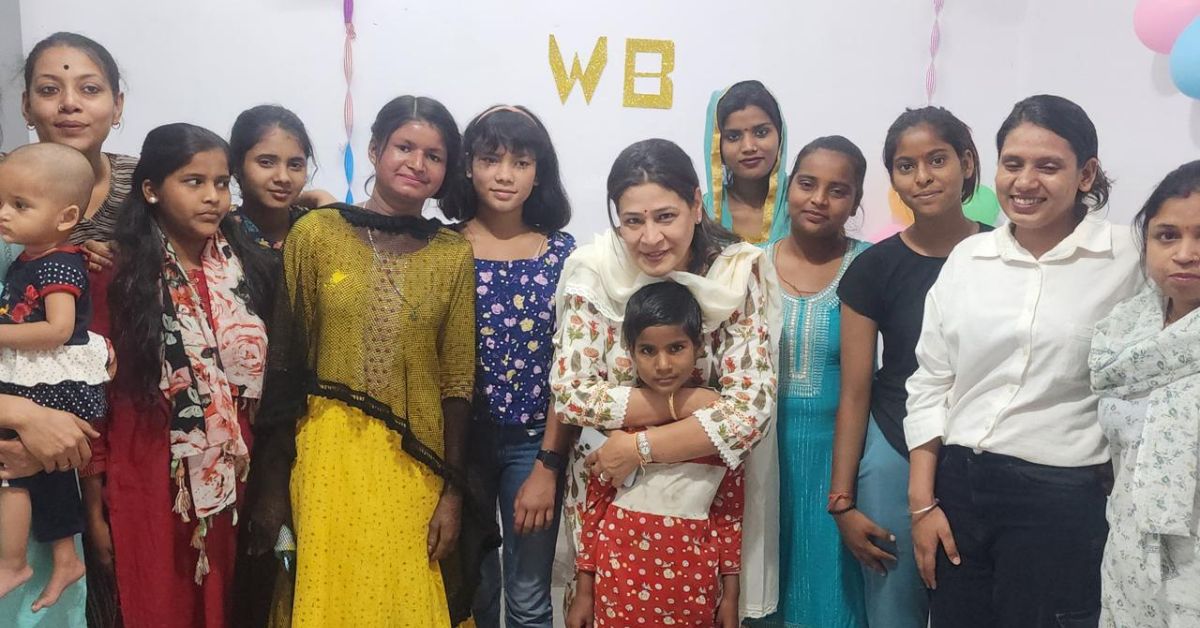 The women of SAHAS with Dr Geetanjali Chopra at the Delhi centre.
The women of SAHAS with Dr Geetanjali Chopra at the Delhi centre.
This is SAHAS. Less about charity, more about community, which has helped around 200 women so far. A space where women from urban villages come to train in tailoring and stitching, but leave with something far more valuable, a sense of self they were told they could never claim.
Here, it doesn’t begin with a mission statement. It begins with a needle, a thread, and the courage to start.
“I had forgotten what it meant to be good at something”
Before Kaushalya found the centre, she never really imagined life could stretch beyond the four walls of her home. “I used to cook, clean, and care for my children. That was it,” she said. “I didn’t mind it at first. I thought that was life. But after a while, I began to feel invisible.”
In many homes across India, women’s work inside the house is expected but rarely valued. The idea that they could step out, earn, and have something of their own often feels out of reach. For Kaushalya, it wasn’t just out of reach, it was something her husband told her she would never do.
Over time, she started to believe it too.
When she first joined the tailoring centre, she couldn’t hold the fabric steady.
“My hands would tremble. I was sure I’d fail.”
But she didn’t leave. She came back, day after day, slowly stitching the first things she could truly call her own.
Now, Kaushalya earns about Rs 5,000 a month. It may not sound like much to some, but for her, it’s the first time she’s had money she didn’t have to ask for. It’s not just an income, it’s independence.
“I bought my son a school bag with my own money. I didn’t need to ask anyone. That’s what I’m proud of.”
For women like Kaushalya, this isn’t about big business or becoming entrepreneurs overnight. It’s about small, steady financial freedom; the kind that brings real choices into their homes. It’s about being able to pay for a child’s school bag, buy vegetables without permission, save a little on the side, and finally know, without doubt, that their work matters.
Across the centre, women who were once told they wouldn’t manage are now managing just fine. They set their own pace. They choose how they learn. They decide what comes next.
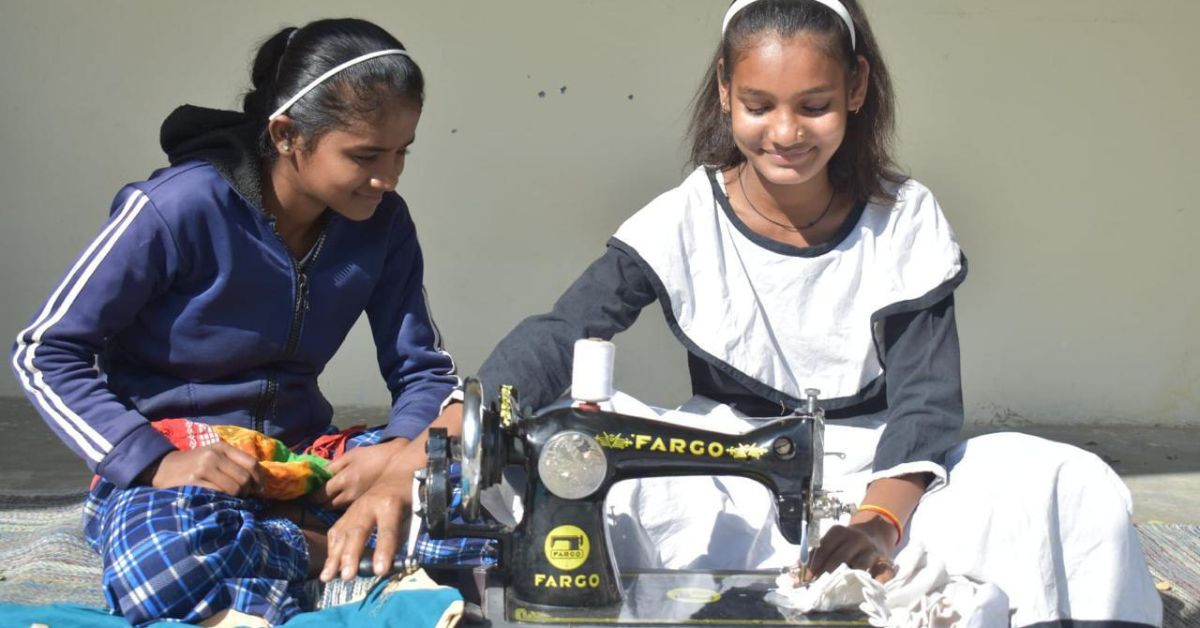 Over 200 women have received training from the Delhi centre of SAHAS.
Over 200 women have received training from the Delhi centre of SAHAS.
For Mannu Kumari, 28, it’s about growing alongside her child, in a space where both are welcome.
“My child is next to me while I stitch. Both of us are learning something new here,” she said.
Married young and with no formal schooling, Mannu didn’t even know how to stitch a straight line when she joined. “No one rushed me. No one told me I couldn’t do it.”
In a country where financial decisions for women are often made by others, these moments of earning, spending, and deciding become radical acts. For many of these women, it’s not about earning more; it’s about finally earning something that’s theirs.
A space to learn, earn, and be seen on their own terms
This shift in Kaushalya’s life and the lives of many women like her didn’t happen in a place with tight rules or fixed outcomes. It happened in a space where women set the pace for themselves.
“That flexibility is by design,” said Dr Geetanjali Chopra, founder of Wishes and Blessings, the organisation behind the SAHAS initiative. “We didn’t want rigid rules or targets. The women can bring their children, take breaks, and take one step at a time. For many of them, this is their first experience of being in a learning environment without judgement.”
In many homes across India, women’s lives are tied to routines and expectations set by others. The idea that they can step into a space where their time, comfort, and progress are fully respected is still rare. That’s what makes this centre different.
What started as a stitching programme has quietly become something more. Women show up not just to work, but to build a community. They bring their children along, learn the alphabet, share chai, and teach each other stitching tricks.
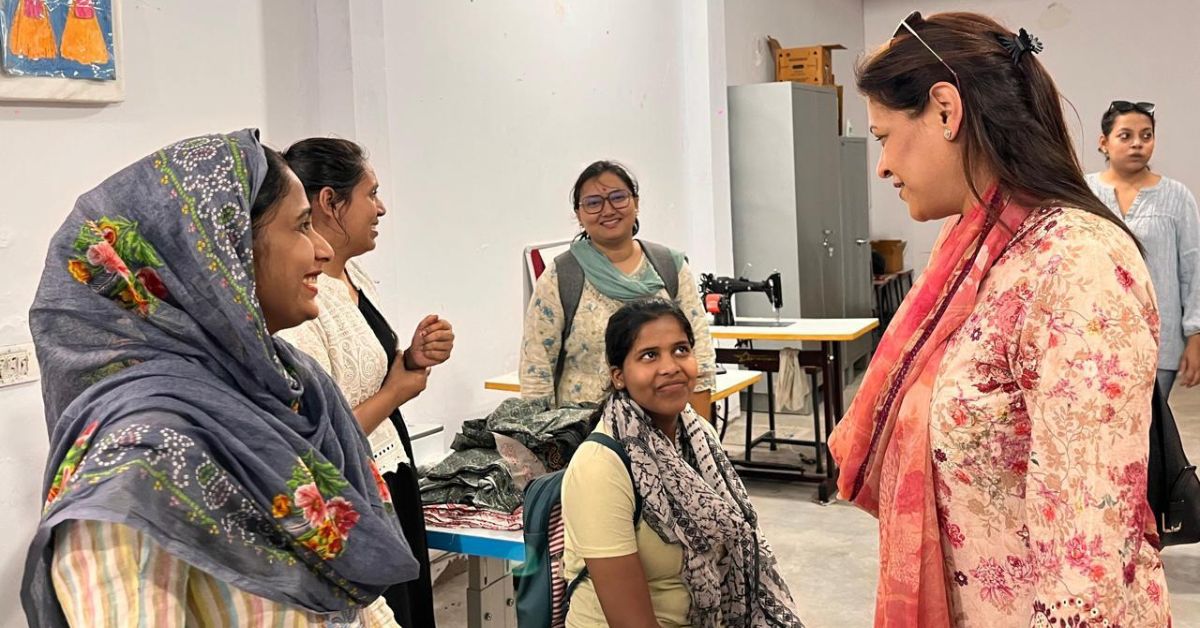 Dr Geetanjali Chopra does regular visits to keep the training centre up and running.
Dr Geetanjali Chopra does regular visits to keep the training centre up and running.
“It’s a shared space, a communal learning ground,” Mannu said.
Here, no one is rushing to hit targets. No one is turned away if they take their time. This isn’t about completing a course or chasing numbers; it’s about women having a space where they can grow, earn, and be seen on their own terms.
SAHAS doesn’t just offer stitching lessons. It offers what many of these women have never been given before: dignity, patience, and the freedom to shape their own path.
“At 52, I am finally learning the alphabet”
Among the oldest learners is 52-year-old Geeta. Speaking to The Better India, she explained that she never went to school. “Girls weren’t sent to school in my time. I worked in fields from when I was a child.”
Today, Geeta is learning to read stitching instructions. “I’m learning the letters so I can follow patterns properly. It feels nice to learn something after all these years.”
According to Ruby Devi, a trainer at the centre, women like Geeta often arrive unsure of themselves. “Some have never held a pencil. But once they get started, it’s hard to stop them. They absorb everything like sponges.”
Ruby, who has trained over a hundred women since SAHAS began, described seeing learners go from hesitant silence to confident collaboration. “They don’t just become tailors. They become decision-makers, not just at the centre, but at home.”
The needle may be small, but in the hands of someone like Geeta, it becomes a powerful tool — not only to sew but to spell out a new chapter in life.
More than money: A new sense of self
Saroj (20) said she barely spoke to anyone when she first joined. “I used to feel like nothing I did mattered,” she said in a low but steady voice. After her father’s death during the pandemic, she and her mother struggled to make ends meet.
“Now I buy rice sometimes. Or oil. Even small things like soap. With the money I earned.”
Saroj earns around Rs 4,000 a month by contributing to orders placed by the NGO, whether for school uniforms, cloth bags, or other garments. Her goal is simple – to never again feel helpless in a crisis. “I used to cry a lot. Now I feel like I have a purpose.”
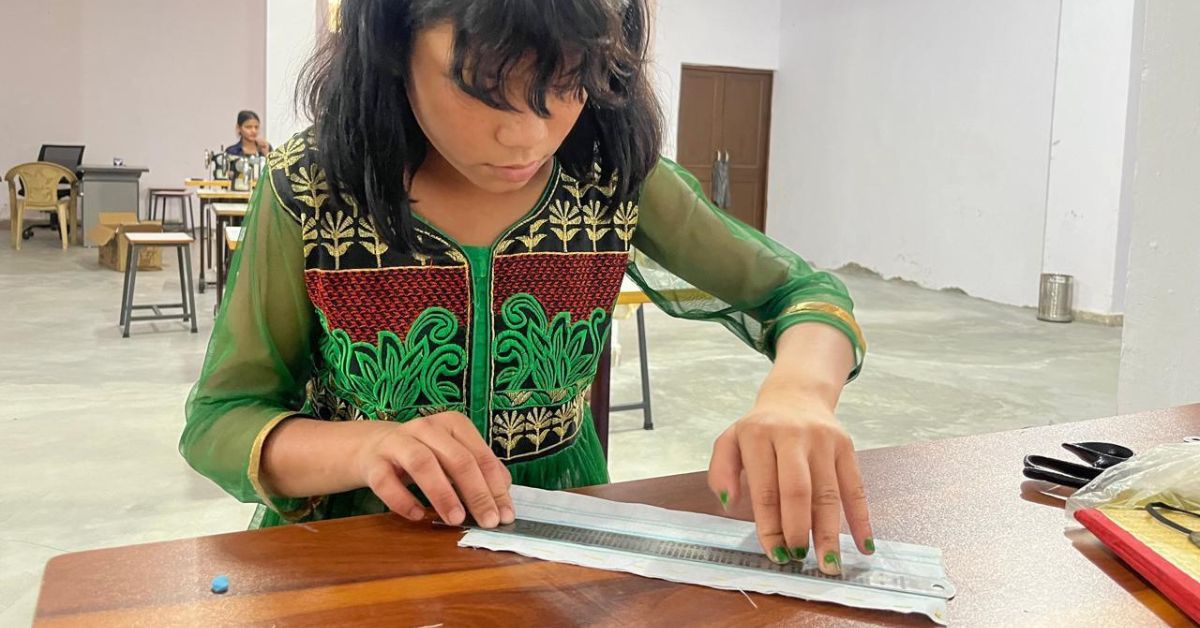 Every rupee earned is a vote of confidence for these women.
Every rupee earned is a vote of confidence for these women.
For most of the women, this transformation isn’t about becoming business tycoons or earning five-figure incomes. It’s about agency – having a say, even if only over their own wallets.
Every rupee earned is a vote of confidence, every stitched seam a step towards a life of choice rather than one of chance.
A meaningful revolution built on sisterhood
While earning is important, many of the women say it’s the emotional security they’ve found at the centre that matters just as much.
“Learning with other women like me made me feel heard and supported,” said Saroj. “I never felt alone here.”
Kaushalya agreed. “If someone’s child is sick, others step in to help with the stitching. If someone can’t afford fabric, we all chip in.”
For Ruby, this kind of support has become part of how the centre works now. “They celebrate everything, when someone stitches her first kurta or even just finishes sewing a few buttons. The way they care for each other, it’s real.”
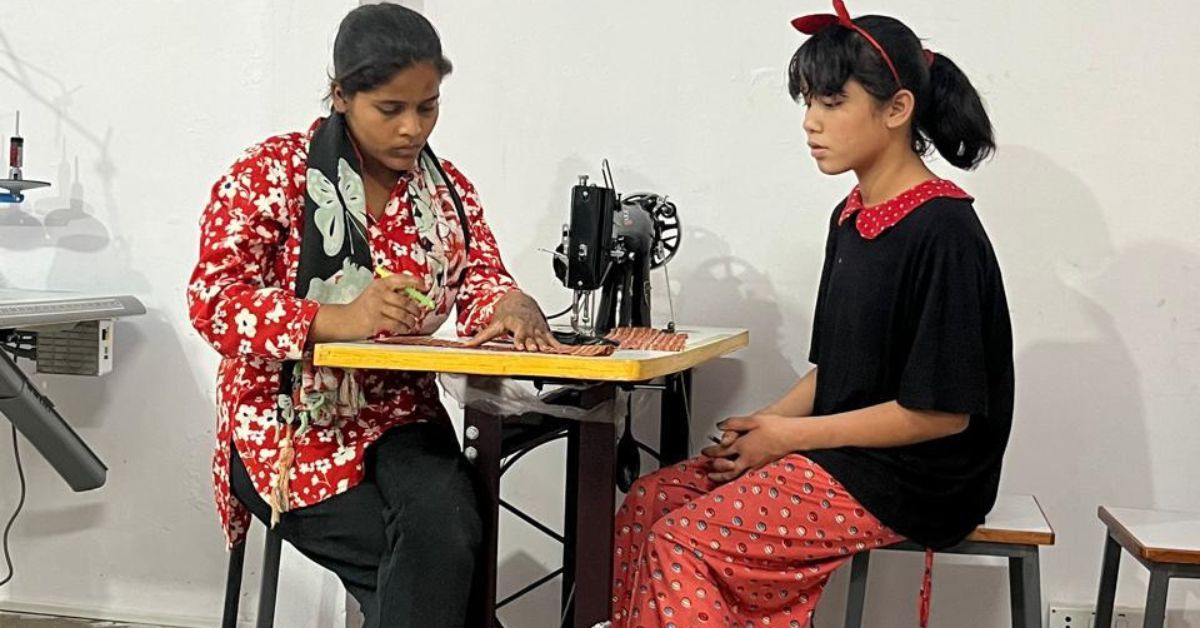 The SAHAS programme was launched in the aftermath of the decline in COVID cases.
The SAHAS programme was launched in the aftermath of the decline in COVID cases.
There are no rules about giving back here — it just happens. Last winter, a few of the women quietly collected money to help one of their peers buy wool to make sweaters for her children. No one asked her to pay them back. “When she got her first payment, she bought everyone samosas,” Ruby said, smiling.
Here, support isn’t just something people talk about; it shows up in small, everyday ways. It’s not a big idea or a slogan. It’s just how they are with each other.
The work behind the scenes
The SAHAS programme was launched in the aftermath of the decline of COVID cases, as a response to the rising number of women approaching Wishes and Blessings for help. “We were getting requests not just for rations or medicine, but for something more long-term,” said Dr Chopra. “That’s when we decided to create something exclusively for women – a space to learn, earn, and heal.”
The initiative is funded largely through events like Jashn-e-Qawwali, a musical fundraiser that attracts community donations. “It’s not just about collecting money,” Dr Chopra said. “It’s about getting people to witness what these women are doing — seeing their work, wearing their creations, and acknowledging their dignity.”
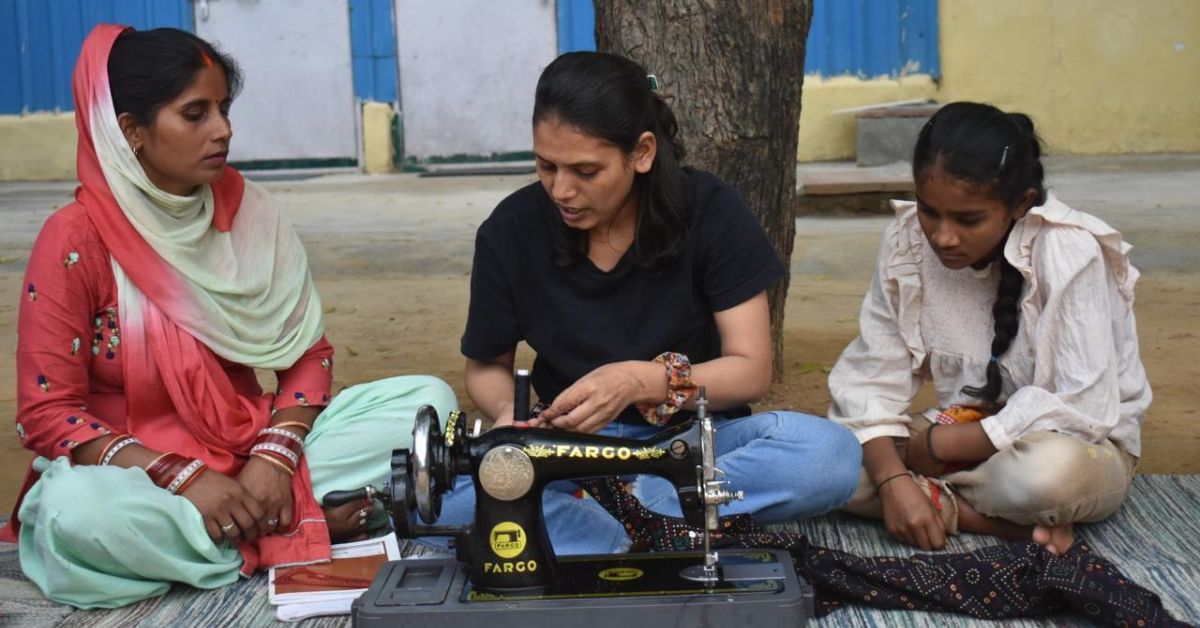 The women trained in the stitching school have now found new means of income and are sustaining their families.
The women trained in the stitching school have now found new means of income and are sustaining their families.
This participatory model, she explained, ensures transparency and connection. “The donors know exactly where the money goes — into machines, materials, trainers’ salaries, and sometimes even tea for the learners.”
Stitching futures, one garment at a time
In just over two years, SAHAS has trained more than 100 women. Some now work independently from home, others continue to fulfil orders through the NGO. A few have even started training newcomers.
Kaushalya said she’s now confident in taking on work from neighbours. “I stitched a kurta for someone in the colony last week. They paid me and said they’ll recommend me to others.”
Mannu hopes to learn embroidery next. “I want to stitch suits for women in my colony,” she said. “And maybe one day, I’ll have my own little shop.”
Geeta, who is still learning to read, wants to sew her granddaughter’s school uniform next year. “With my own hands,” she said, her voice swelling with quiet determination.
“We are not broken. We were just waiting to begin.”
At its heart, this story isn’t about a sewing machine or a skill. It’s about the first time a woman held a pencil. The first time she realised she could make something and sell it. The first time she earned, and didn’t have to ask.
Dr Chopra said, “Change doesn’t have to start with something big. It begins with one step. One skill. One woman finding her voice.”
She encourages anyone who wants to contribute, whether with fabric, time, or funds, to reach out. “If you have a skill, teach it. If you can donate something, do it. It all goes into building someone’s confidence.”
In a world that often tells women to stay small, this tailoring room tells a different story. The machines may be old. The walls may be bare. But the futures being stitched together here are full of colour, courage, and possibility.
Each garment made is more than fabric. It is proof that every woman who picks up a needle here is not just making clothes. She’s making her place in the world.
News